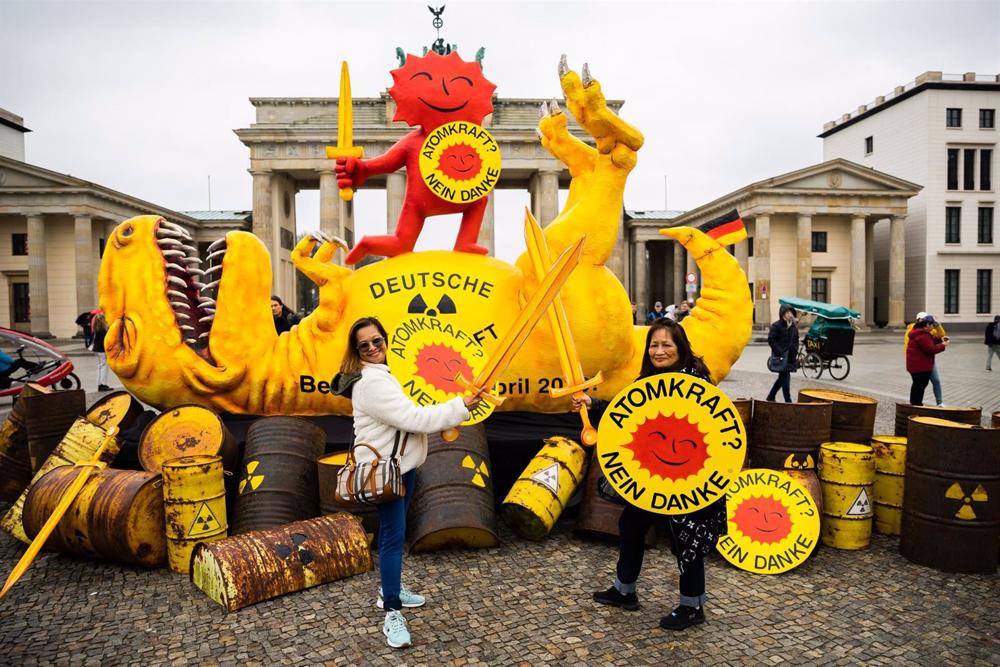
This Saturday, 62 years after Germany’s first commercial nuclear power plant went into operation, the last three operating reactors are being shut down.
However, the final phase-out of nuclear power generation continues to be the subject of intense political debate, both for and against the measure.
While Environment Minister Steffi Lemke of the Green Party has expressed her relief at the measure, the Liberal Democratic Party (FDP), also a member of the government coalition, considers it a «strategic mistake».
The abandonment of nuclear power makes Germany safer,» Lemke told DPA. The risks of nuclear power are ultimately uncontrollable in the event of an accident,» she added.
In contrast, Finance Minister and FDP leader Christian Lindner believes that the three nuclear power plants should remain in reserve and not be decommissioned. »If we were to start them up in the next two or three years, we would have that possibility,» Lindner argued in an interview with the Welt television channel. Lindler has blamed the Greens for thwarting that possibility.
In fact, the nuclear power plants should have been taken off the grid at the end of last year, according to a decision taken by the previous government, led by Angela Merkel, after the catastrophe at the Fukushima reactors.
However, due to the energy crisis caused by the war in Ukraine the current coalition led by Social Democrat Olaf Scholz decided last year to keep the three reactors in operation during the winter.
The shutdown of the last power plant is scheduled for shortly before midnight this Saturday. It is unclear which of the three reactors will be the last, whether Bavaria’s Isar 2, Lower Saxony’s Emsland or Baden-Württemberg’s Neckarwestheim 2.
The operators have prepared for the deadline well in advance. The reactors’ power output will be gradually reduced and then the generator will be disconnected from the grid and the reactor will be shut down completely.
The environmental organization Greenpeace celebrated the abandonment of nuclear power at Berlin’s Brandenburg Gate, where it unfurled a banner with the iconic anti-nuclear figure and the slogan »Nuclear power? No thanks,» as well as a sword on a replica of a dinosaur. The dinosaur’s belly read »German nuclear energy» and »Defeated on April 15, 2023!».
Greenpeace has thus celebrated that it is »good day» for climate protection and a success for the anti-nuclear movement. The executive director of Greenpeace Germany, Martin Kaiser, also demanded that the federal government should now focus on the safe disposal of nuclear waste accumulated over decades that will be radioactive for millions of years.
At the Brandenburg Gate itself, some people also protested against the closure of nuclear power plants. The association Nuklearia had announced in an appeal that it wanted to put a positive spin on nuclear power. »We consider nuclear energy to be the best way to preserve our prosperity and at the same time protect nature and the climate,» it said.
In the town of Lingen, near one of the reactors being shut down, anti-nuclear activists have rallied in front of the ANF fuel assembly plant, which belongs to the French Framatome group, to also demand the cessation of nuclear fuel production. A joint venture of Framatome and the Russian state-owned Rosatom plans to produce fuel rods for nuclear power plants in Eastern Europe at Lingen.
The operating company of the fuel element plant rejected calls to close the plant: »Framatome Advanced Nuclear Fuels (ANF) has an unlimited operating license. The plant has been producing fuel elements with a high level of safety for more than 45 years and has at all times complied with all legal requirements and procedures,» the company said.
Source: (EUROPA PRESS)






